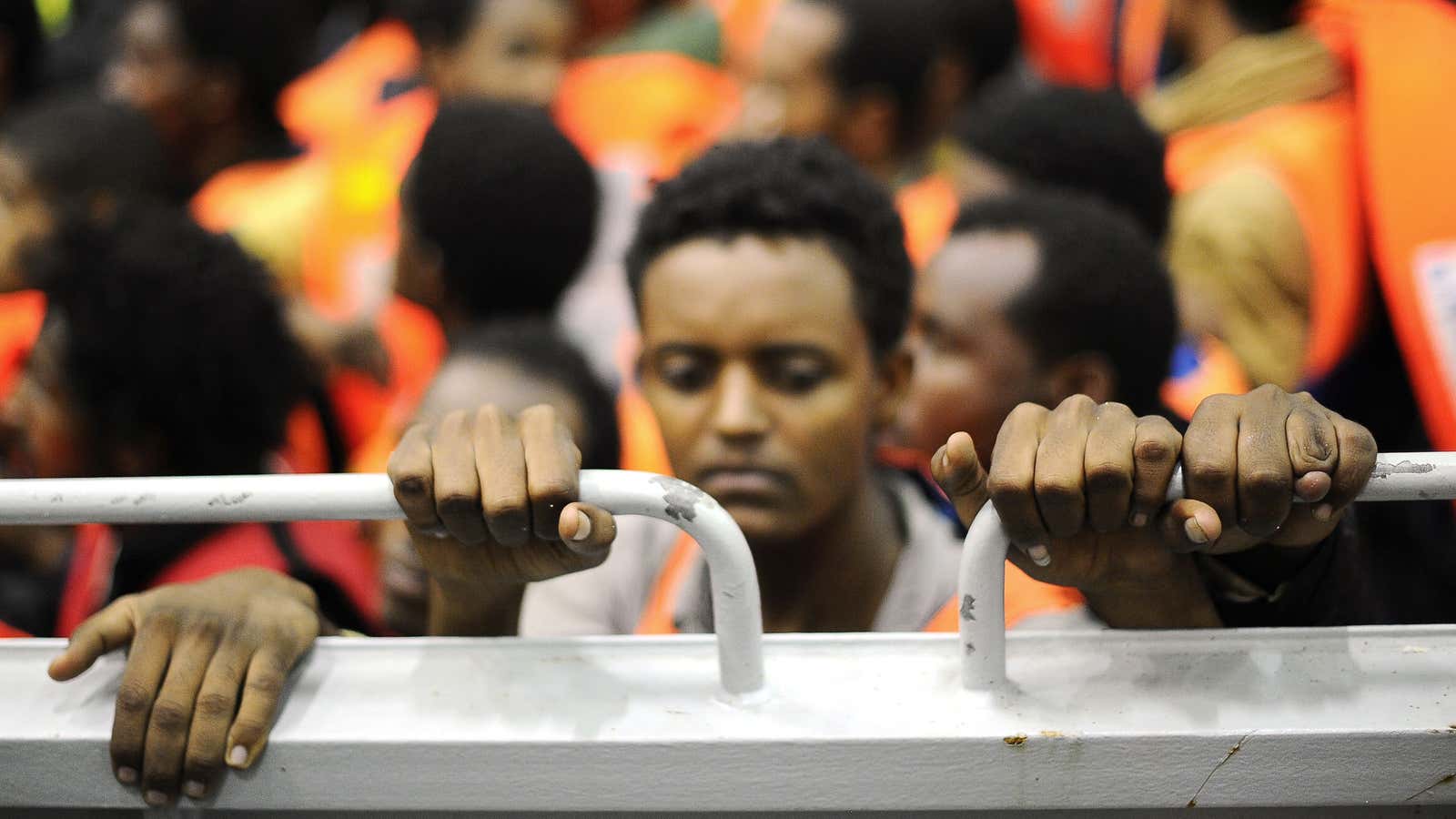After the tragic drowning of hundreds of migrants last week brought the Mediterranean Sea’s death toll to more than 1,750 people this year, European leaders met for crisis talks in Luxembourg. But their “ten point action plan” involves more talk about security measures than a commitment to search-and-rescue.
Reinforcement of the border-control mission, Triton, alongside destroying smuggler vessels, tightening fingerprinting procedures, rapidly returning irregular migrants and gathering intelligence on migratory flows were some of the key points. The pilot resettlement project would merely be voluntary, and while extending Triton’s operational area is proposed, it will be within the mandate of its controlling body, Frontex, which is to “reinforce and streamline cooperation between national border authorities,” not, first and foremost, to save lives at sea.
Amnesty International reported that the the EU Joint Foreign Affairs and Home Council strategy still marked a “positive break from the previous policy of denial and empty rhetoric,” but warned that “the devil [was in] the detail… The full scope of the area of operations, the resources and assets made available for search-and-rescue, and by when, will be crucial in determining whether lives will be saved.”
The proposal will be presented at an emergency European Council meeting in Brussels on Apr. 23, followed by the release of a full agenda on migration in May 2015, which Amnesty has described as “the litmus test for Europe’s commitment to save lives in the Mediterranean.”
These days, that commitment is flagging.
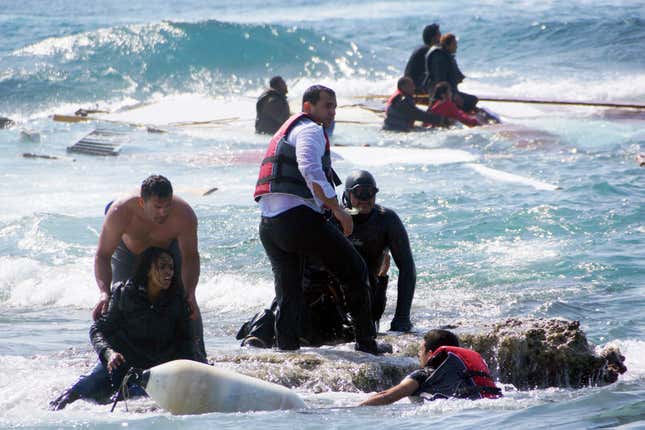
In Oct. 2013, following one of the first large-scale migrant shipwrecks in which more than 360 people drowned off the coast of Italy’s southernmost island, Lampedusa, the country established a navy-run humanitarian mission called Mare Nostrum (meaning “our sea” in Latin).
With a budget of nine million euros a month, and the specific task of rescuing migrants in the Mediterranean Sea, Mare Nostrum saved about 170,000 lives during its 14 months of operation. Yet, due to financial strain and political pressure from other EU states—including Britain, whose leadership claimed it created a “pull factor”—the mission ended in Nov. 2014, and was effectively replaced by the EU’s Operation Triton.
Coordinated by an agency which primarily controls movement at Europe’s land borders, Triton operates at a third of the cost. And unlike Mare Nostrum’s ships, whose area of operation extended south of Lampedusa for about 100 nautical miles, Triton is limited to a border patrol of 30 nautical miles off the Italian and Maltese coasts (far from where the vast majority of boats get into trouble). Most significantly, its mandate is security, not search-and-rescue. It is only deployed to assist in emergency circumstances by the Maritime Rescue Coordination Centre (MRCC) in Rome.
While Frontex spokesperson Izabella Cooper told Quartz that Triton had “never hesitated going close to the Libyan waters,” and “wherever people are dying [would] go as far as needed,” the death rate has almost doubled. Amnesty International attributes this to a gap “left by Mare Nostrum and not filled by Triton.” Where Mare Nostrum had three large ships, ten patrol vessels and nine aircraft routinely in operation, Triton has no large ships, seven patrol vessels and only two aircraft.
Frontex told Amnesty International that their fleet was appropriate to the assignment, which is “to control the EU’s borders, not to police 2.5 million square kilometers of the Mediterranean.”
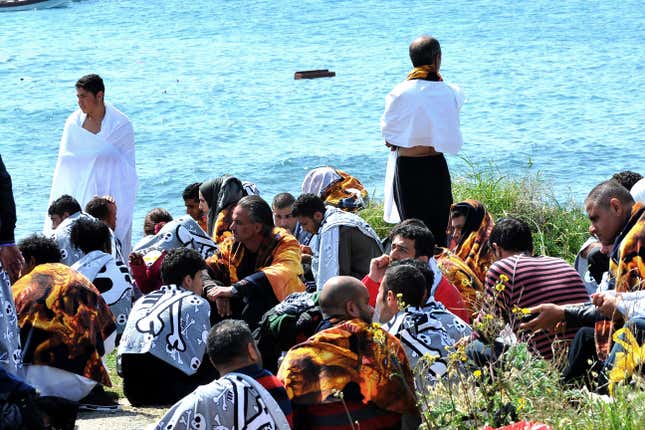
Since its inception, only a third of migrants rescued can thank Triton for delivery to dry land. The remainder are still being rescued by the Italian and Maltese coast guards, with the assistance of commercial ships, as well as by a few small, privately-financed operations, like the Migrant Offshore Aid Station (MOAS). While Italy is no longer spending millions on Mare Nostrum, the coast guard—whose primary commitment to rescue means its activities extend far beyond the boundaries of territorial waters, including more than 500,000 square kilometers of sea—is under enormous strain.
“We won’t be able to take them all, if we remain the only ones to go out there,” the head of the Italian coast guard’s MRCC, admiral Giovanni Pettorino, told Amnesty.
The merchant shipping sector has also suffered financial loss and placed its crews in high-risk situations to implement rescue procedures, with 822 vessels being redirected in 2014. The European Community Shipowners’ Association told Amnesty it was “unacceptable that the international community is increasingly relying on merchant ships and seafarers to undertake more and more large-scale rescues, with single ships having to rescue as many as 500 people at a time.”
“This is a European emergency, and until now, the response, the commitments, and the rescue operations have been Italian,” said the country’s foreign minister, Paolo Gentiloni told the Italian daily Corierre della Serra. “But a situation where a European emergency is addressed solely with Italian resources and commitments is no longer sustainable,” he said.
Despite the risks inherent to the journey, especially during winter months, migrants have continued to board unsafe vessels in desperate hope of a better life in Europe. Twenty-one thousand have arrived in Italy since the beginning of 2015. But many never reached land. Most recently, an estimated 850 people drowned when their ship capsized off the coast of Libya in what the United Nations Refugees Agency (UNHCR) reported to be “the deadliest incident in the Mediterranean.” This came after a warning from UN high commissioner for refugees, António Guterres, two months earlier that thousands more would perish if Europe did not “step up its capacity to save lives, with a robust search-and-rescue operation in the central Mediterranean.”
“The strengthening of border control is not the solution to this,” Izabella Cooper told Quartz, contrary to the EU’s proposal to bolster Frontex operations. “We need a common European solution.”
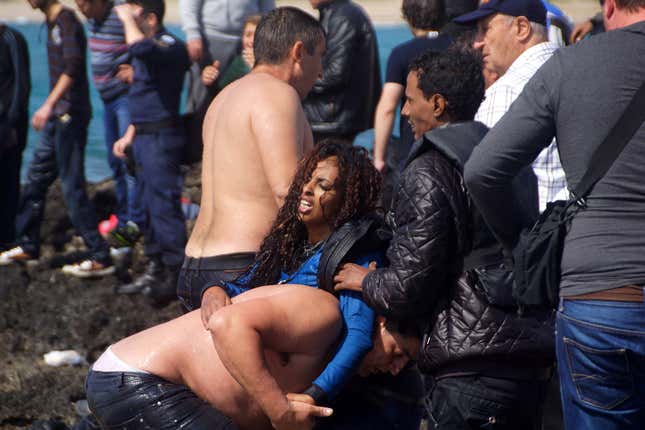
EU politicians have painted Triton as that common solution, but its objective is not saving lives at sea, and it receives only 30% of Frontex’s annual 114 million euro budget; the rest of which goes to the control of European land borders through financial support, guest officers, coordination assistance, and surveillance equipment. While countries under the Schengen visa agreement, together with the United Kingdom and Ireland, contribute more than half of Frontex’s annual budget, specific assistance to Triton is made only in the deployment of vessels and other maritime equipment.
“The EU states don’t make individual contributions to Triton,” Cooper confirms. “The contributions come from the Frontex budget.”
Amnesty International confirmed to Quartz that, according to their data, alongside reports from UNHCR, Frontex is implicated in pushbacks of asylum seekers at both land and maritime borders, partly because current EU policy fails to distinguish between illegal migrants and genuine refugees.
On the border where Bulgaria and Greece meet Turkey, intercepted migrants have been routinely returned or placed in detention. UNHCR reports published in Mar. 2015 described the deaths of Iraqi Yazidi migrants, who were beaten by Bulgarian border guards and had their belongings seized. Two of the group, suffering severe injuries, later died from hypothermia in Turkey.
“It is deeply disturbing that people in search of international protection are being turned away, often with violence,” said William Spindler, a UNHCR spokesman in a statement released at the time. “EU member states at the external border need to ensure that these practices stop, and should conduct independent and transparent investigations into allegations of abuses and illegal practices in their border regions.”
Frontex denies involvement in any of these violations. However, Amnesty told Quartz that their involvement can be difficult to track given widespread funding, support and equipment like unmarked boats used routinely in pushbacks, which may be financed by the organization.
In their support of Frontex—masqueraded to the public as a solution to migrant death at sea—EU countries are more effectively backing locked land borders, one of the main motivators for genuine refugees to take the perilous journey across the ocean in the first place.
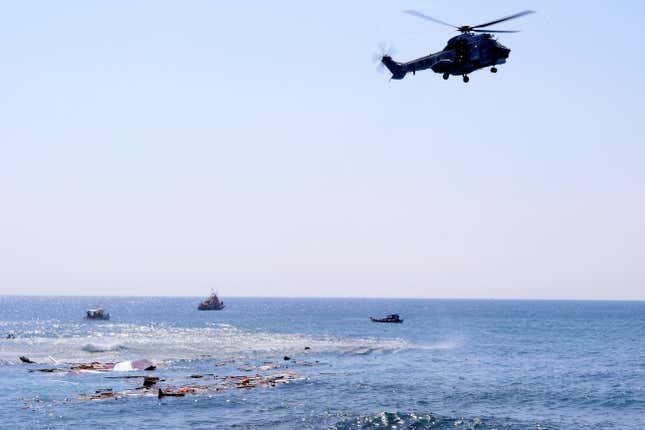
Salvi Pitta from Watch the Med—a hotline for migrants in distress at sea—told Quartz that the problem could be “resolved by opening the borders.” By terminating Frontex and other, similar programs, Europe would have more than enough money to resolve the migrant crisis.
In most of the EU, immigration is a toxic subject. Fears of imported terrorism are being leveraged by right-wing, xenophobic parties to gain supporters. In the last 15 years, policies have shifted from upholding equality to a clear focus on security, Maria Giovanna Manieri, a program officer for the Platform for International Cooperation on Undocumented Migrants (PICUM) told Quartz. This is driven largely by “fear, racism and xenophobia,” she says. Activists and migrant-welfare groups argue that these policies are directly responsible for the loss of life at sea.
It is near-impossiblefor migrants to obtain visas while still in their country of origin, Judith Glietze of Borderline Europe tells Quartz, leaving them with no choice but to risk their lives. Resettlement opportunities are limited, with EU countries pledging to take only 9.5% of the 380,000 Syrian refugees identified by the UNHCR. Even for those migrants who already have family in Europe, the legal routes to immigration (and naturalization) are few and far between.
“We tried our best to travel to Europe in a legal way, but no matter how hard we tried, we were not allowed,” 47-year-old Syrian refugee Mohamed told Amnesty International, after applying for asylum through the German, Belgian and Swedish embassies. He had no choice but to hire a smuggler to get him to Europe by boat in 2014.
Italian human rights lawyer Fulvio Vassallo he wrote on his blog, Diritti e Frontiere (Rights and Borders), that, while the plan hatched in Luxembourg was “apparently aimed at smugglers… in the absence of other measures of rescue at sea, but also on the ground, this will just become a real war against migrants.”
In a report on the EU’s failure to save lives released Apr. 22, Amnesty International said Triton was “the wrong answer” to the migration crisis. Only a humanitarian operation, it said, could meet the magnitude of search-and-rescue currently required in the Mediterranean.
“European leaders gathering in Brussels have an historic opportunity to end a spiraling humanitarian tragedy of titanic proportions,” said the organization’s director for Europe and Central Asia, John Dalhuisen, in a statement released Apr. 22.
Whether this long-awaited commitment to human life will be delivered is yet to be seen. The European Council meeting holds some hope, but “in the end, it’s a meeting of ministers,” said Manieri. Their motivations, driven by public opinion, have led them to fund Frontex, rather than investing the same money in effective, international search-and-rescue programs.
“It can only be reversed through another political decision,” Manieri said, adding that Europe was “denying the real issue”: lack of possibilities for migrants both in reaching Europe legally, and thriving once they arrive. “They find a job, or they fall in love, this is part of natural life… but migrants are too often left in administrative limbo,” she stressed.
Stepped up search-and-rescue operations are urgently needed, albeit a Band-Aid solution. A true opening of Europe’s frontiers would require increased admissions, regular migration channels, and doing away with the farce of funding a border-control operation as a solution to one of the greatest humanitarian crises of our time.
